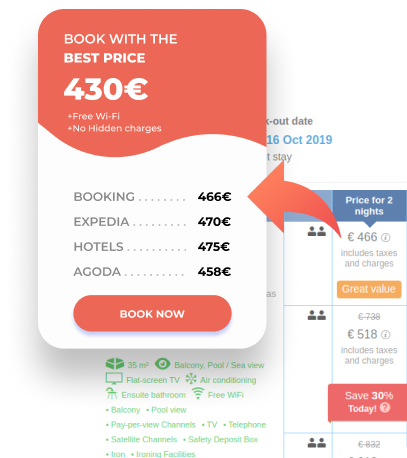What are price comparison tools?
Hotel price comparison tools compare the rates of accommodations in different online channels. They essentially compare the prices offered by the establishment on its website with respect to the one published on OTAs.
There are two types of price comparison tools:
- The first type is known as metasearch engines or aggregators: Kayak, Tripadvisor, Google Hotel, Skyscanner, among others.
- The second type is Hotel Price Comparison widgets: price comparators on the hotel’s website.
Why are price comparison tools useful?
With price comparison tools, guests do not need to browse different OTAs and then consult the hotel’s website to check the price offered by the property.
Both hotel widgets and metasearch sites display prices in an easy-to-compare format and help select the best deal quickly.
As a result, we can state that price comparison helps the user choose and book their room in a faster way and at the best price.
How do hotel price comparators work on an establishment’s website?
A price comparator on the hotel’s official website collects the user’s query data in real time and in a personalized way for each request (no discounts are used for loyalty / affiliation programs and most importantly that they are real).
In other words, the prices shown are those published by the OTAs.
The process would be as follows:
- The guest searches for room availability and prices on the hotel’s website.
- The price comparison tool reads the search (dates, room type, etc.) and automatically sends the request to the OTAs, obtaining the prices published by them.
- Once the price comparison is done, a widget appears for the visitor.
In 123Compare.me we send many queries at once, get a response from the OTAs and display the widget in 2-7 seconds.

Can the prices in the “Price Comparison” widget be incorrect?
Yes and no.
No, since there is no human interaction in the process. We cannot modify the prices in any way. The widget shows the same price published in the OTA.
But … yes.
Sometimes it happens. Although it is very rare.
Some OTAs play with prices and may update them without the hotel’s consent.
For example, an online platform may use “geographic” rates, changing prices based on the guests’ search location.
Therefore, the prices for your location may be different from the prices for the visitor to the New York or Bangkok page. As a result, you may find, on occasion, that certain prices are not correct for that location.
What are the advantages of “Price Comparison” widgets over meta-searches?
First, the traveler does not need to visit a special site to perform the search. They can view the rate comparison widget while browsing the hotel’s website.
In addition, travel partners (hotels, travel agencies) submit prices to metasearches. However, metasearches do not check the accuracy of this information. Therefore, they cannot guarantee that the prices shown are correct or that they include all taxes and fees.
123Compare.me collects prices independently. We verify the prices ourselves and can guarantee that the prices we collect are real.
Last but not least, some metasearches, including Google Hotel, use “pay-per-click” prioritization models. It means that hotels that pay more appear higher in ranking. Definitely, this ranking does not favor the interests of the person booking.
Why do hotels use “Price Comparison” widgets?
We explored how Hotel Price Comparison works. More importantly, why do hotels use it, and why is it good for guests?
For every booking made through an online platform (Booking.com, Expedia, etc.) hotels pay a commission. This commission usually varies between 10-25% per booking.
Additionally, OTAs have the opportunity to undercut hotel prices and offer better deals for their guests. In this regard, hotels invest a lot of time in making sure they offer the best price on the direct website.
In many cases, the hotel will not only guarantee the best rate, but will also offer additional advantages to the direct booker: a better cancellation policy or free last-minute check-out.
The “Price Comparison” widget is a way to communicate the advantages of direct booking. It helps hotels be more transparent with guests and helps guests save time browsing the Internet and get the best deal.







